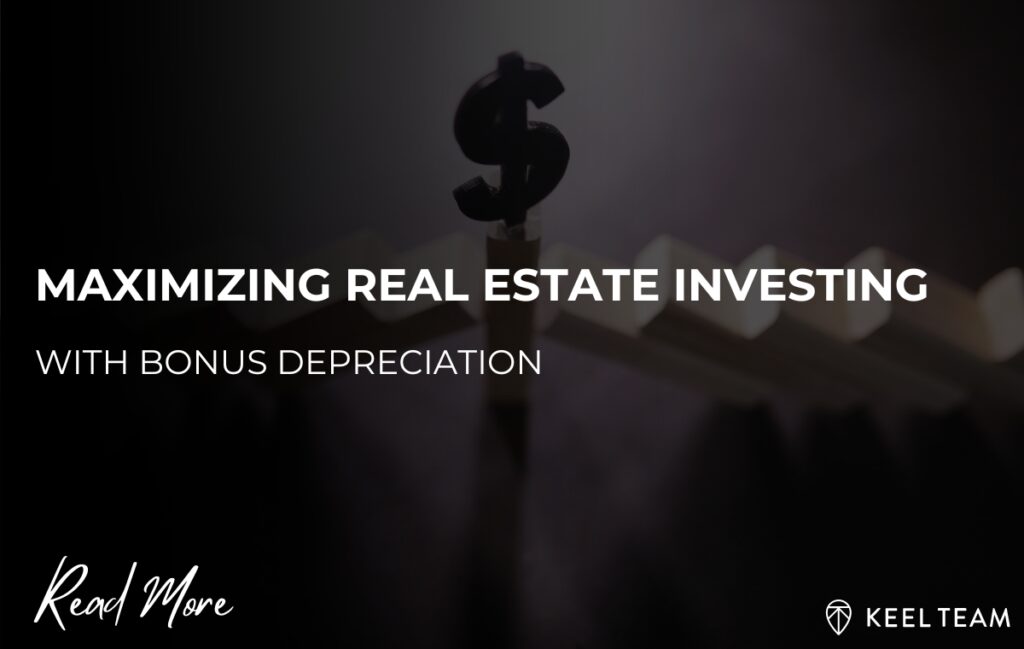Maximizing Real Estate Investing with Bonus Depreciation
-
 Tristan Hunter - Investor Relations
Tristan Hunter - Investor Relations

Real estate investing has historically offered a multitude of opportunities to grow wealth and secure financial stability. Among the various strategies and tax benefits available to investors, bonus depreciation stands out as a powerful tool. Understanding how to leverage bonus depreciation can potentially enhance your investment returns and provide substantial tax advantages. Let’s jump right in!
What is Bonus Depreciation?
Bonus depreciation is a tax provision that allows real estate investors to accelerate the depreciation of qualified properties. Instead of spreading the depreciation deductions over the property’s useful life, bonus depreciation enables you to deduct a significant portion of the property’s cost in the year it is placed into service. This accelerated depreciation can greatly reduce your taxable income and potentially increase your cash flow.
Why is Bonus Depreciation a Game-Changer in Real Estate Investing?
Increased Depreciation Deduction
Depreciation accounts for the wear and tear, deterioration, or obsolescence of an asset over time. With bonus depreciation, you can take a larger deduction upfront. This means that in the year you acquire and place a property into service, you can typically deduct a substantial portion of its cost, thereby reducing your taxable income significantly.
Cost Segregation Opportunities
Bonus depreciation becomes even more beneficial when paired with a cost segregation study. This study breaks down the property into various components, such as appliances, fixtures, and specific building improvements. These components often qualify for shorter depreciation periods, making them eligible for immediate bonus depreciation. Conducting a cost segregation study can maximize your depreciation deductions and further reduce your taxable income.
Flexibility and Investment Returns
By leveraging bonus depreciation, real estate investors can potentially offset a significant portion of their taxable rental income. This tax advantage often increases your cash flow, allowing you to reinvest in additional properties or improve existing ones. The flexibility to reinvest and grow your portfolio can lead to substantial long-term gains.
Portfolio Diversification
Real estate investing generally provides excellent opportunities for diversification. By spreading your investments across different property types, locations, and strategies, you can potentially mitigate risks and enhance returns. Bonus depreciation serves as an additional incentive to include real estate in your investment portfolio, offering tax benefits that can likely improve the financial viability of your investments.
Are you looking to get started with real estate investing but don’t know where to begin? Download our FREE eBook authored by Andrew Keel and learn how you can get started via the passive investing route.

Real Estate Investing Example of Bonus Depreciation
Imagine you purchase a commercial property for $1 million. Under normal circumstances, you would depreciate this property over 39 years. However, with bonus depreciation, you can immediately deduct a large portion of this cost in the year of acquisition. If a cost segregation study identifies $200,000 worth of components eligible for a five-year depreciation schedule, you could deduct this amount upfront, significantly reducing your taxable income.
Key Considerations and Limitations
While bonus depreciation offers substantial benefits, it’s important to note that it is subject to specific rules and limitations. For instance, the percentage of cost that can be deducted upfront decreases over time. As of 2024, bonus depreciation stands at 60%, and it will continue to phase out annually until it is eliminated in 2027. Additionally, not all properties or components qualify for bonus depreciation, so it’s crucial to consult with a qualified tax professional to understand the eligibility criteria and compliance requirements. We, at the Keel Team, invest in the mobile home park asset class which typically qualifies for bonus depreciation.
The Role of a Qualified Tax Professional in Real Estate Investing
Navigating the complexities of bonus depreciation requires expert guidance. A qualified tax professional can help you identify eligible properties and components, conduct cost segregation studies, and ensure compliance with all tax regulations. They can also provide strategic advice on how to optimize your depreciation deductions and potentially maximize your overall investment returns.
Conclusion
Bonus depreciation is a powerful tax benefit that can potentially enhance the financial viability of real estate investments. By accelerating depreciation deductions, you can possibly reduce taxable income, increase cash flow, and improve overall investment returns. However, it is essential to understand the specific rules and limitations associated with bonus depreciation and to work with a qualified tax professional to fully leverage this benefit.
Real estate investing, when paired with savvy tax strategies like bonus depreciation, has the ability to transform your financial landscape. By incorporating this powerful tool into your investment approach, you can potentially unlock substantial tax savings and achieve greater financial success in your real estate ventures.
Consider consulting with a tax professional to explore how bonus depreciation can benefit your specific investment strategy and help you achieve your financial goals. Good luck!
Learn more about mobile home park investing.
Interested in learning more about mobile home park investing? Get in touch with us today to find out more.
Disclaimer:
The information provided is for informational purposes only and is not investment advice or a guarantee of any kind. We do not guarantee profitability. Make investment decisions based on your own research and consult registered financial and legal professionals. We are not registered financial or legal professionals and do not provide personalized investment recommendations.

Tristan Hunter - Investor Relations
View The Previous or Next Post
Subscribe Below 👇





